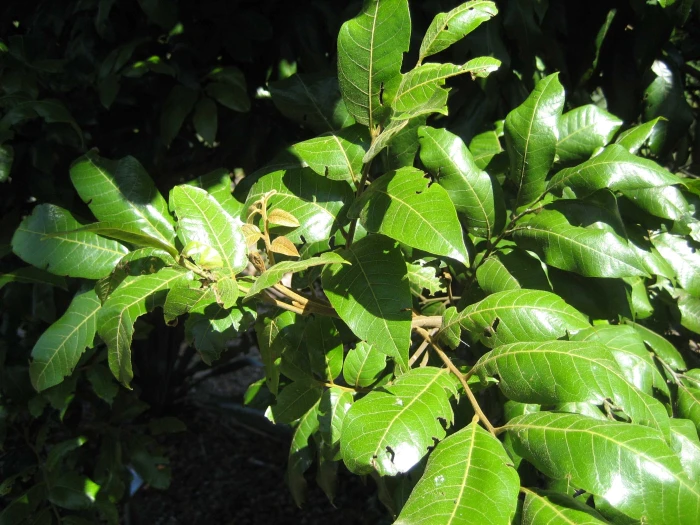Titoki
/
(Alectryon excelsus)
Titoki (Alectryon excelsus)
/

Kahuroa
Public domain
Image By:
Kahuroa
Recorded By:
Copyright:
Public domain
Copyright Notice:
Photo by: Kahuroa | License Type: Public domain | License URL: https://creativecommons.org/public-domain/ | Uploader: Kahuroa | Publisher: Wikimedia Commons | Title: AlectryonExcelsus.jpg | Notes: Allium angulosum L.: flower |





















































Summary
Alectryon excelsus, commonly known as Titoki, is an evergreen tree native to the coastal and lowland forests of New Zealand. It is a sub-canopy tree that can grow up to 9 meters (30 feet) in height, with a distinctive twisting trunk and smooth dark bark. The spreading branches support pinnate leaves that provide a lush, green appearance throughout the year. In spring, Titoki produces small, inconspicuous purple flowers, followed by seeds that take up to a year to mature. The seeds are encased in a hairy woody capsule, which splits open to reveal bright red fleshy arils with a black seed, creating a striking visual contrast, although the fruit is not palatable.
Titoki is valued for its ornamental features, including its attractive bark and the vibrant red and black fruit display. It is suitable for urban planting, border planting, and as a specimen tree in residential gardens. The tree prefers full sun to part shade and thrives in soils with medium drainage. While it is relatively low-maintenance, it may require some formative pruning to develop a strong structure. Titoki is not known for aggressive roots or significant disease problems, making it a reliable choice for gardeners. However, it is not tolerant of heavy frosts and should be protected from cold winds in cooler climates.CC BY-SA 4.0
Titoki is valued for its ornamental features, including its attractive bark and the vibrant red and black fruit display. It is suitable for urban planting, border planting, and as a specimen tree in residential gardens. The tree prefers full sun to part shade and thrives in soils with medium drainage. While it is relatively low-maintenance, it may require some formative pruning to develop a strong structure. Titoki is not known for aggressive roots or significant disease problems, making it a reliable choice for gardeners. However, it is not tolerant of heavy frosts and should be protected from cold winds in cooler climates.CC BY-SA 4.0
Plant Description
- Plant Type: Tree
- Height: 18-60 feet
- Width: 10-20 feet
- Growth Rate: Moderate
- Flower Color: N/A
- Flowering Season: Spring
- Leaf Retention: Evergreen
Growth Requirements
- Sun: Full Sun, Part Shade
- Drainage: Medium
Common Uses
Bird Garden, Butterfly Garden, Low Maintenance
Natural Habitat
Coastal and lowland forests of New Zealand
Other Names
Common Names: New Zealand Oak
Scientific Names: Alectryon excelsus, Evonymoides excelsa
GBIF Accepted Name: Alectryon excelsus Gaertn.
